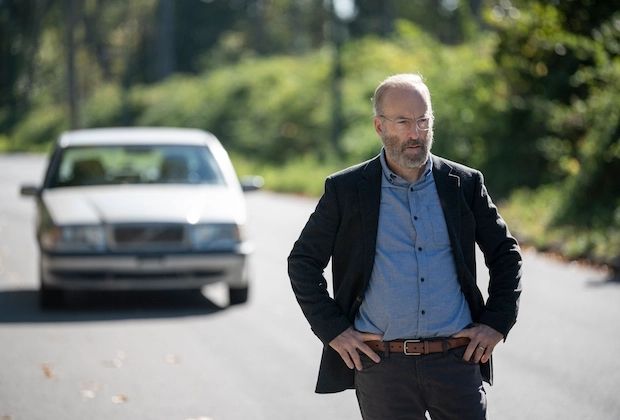'Lucky Hank' Review: Bob Odenkirk in AMC's Low-Stakes Academic ...

Some of the best television shows are about whip-smart operators and the political nuances of their professional worlds. So why then is it so challenging to make a satisfying series about academia? It’s not only difficult to think of a television show that has succeeded in lifting the veil of a university, it’s tough to think of shows that have even tried. The most recent swipe at it was Netflix’s “The Chair,” a thin but charming dramedy starring Sandra Oh that ended after a single season. Even as college campuses remain a go-to battleground for American culture wars, the inner lives of the professors caught in the crossfire are usually reserved for novels.
The latest such attempt to animate the tenured life is AMC’s “Lucky Hank,” which is built from just such a novel. It’s an adaptation of “Straight Man,” the Richard Russo novel that preceded his Pulitzer Prize-winning “Empire Falls.” Much of Russo’s work borrowed elements from his real-life origins as an English professor-turned-novelist, which explains why “Lucky Hank” so accurately captures professorial ennui. But it might capture ennui a little too well, resulting in a show that seems to amble in no particular direction with little indication of when it might hit a stride.
Bob Odenkirk stars as William Henry Devereaux Jr. — no wonder he goes by Hank — who chairs the English department at Railton College, a small and nondescript liberal arts institution in middle Pennsylvania. The length of Hank’s tenure can be measured by the depth of his cynicism, which peaks early in the pilot when his gadfly writing student Bartow (Jackson Kelly) suggests his experimental prose has gone over Hank’s head. Who is Hank to judge the writing of others, Bartow asks, when his only successful novel came out ages ago, and is barely in print? Hank, feeling his Howard Beale fantasy, launches into an anti-Railton rant, calling the school “mediocrity’s capital” to audible gasps from his students.
That moment of acidic candor is what passes for an inciting incident in “Lucky Hank,” which initially has all the forward momentum of an undeclared freshman. The backlash to Hank’s diatribe is immediate, forcing Railton’s non-confrontational Dean Rose (Oscar Nuñez) to play the reluctant peacemaker. Hank retreats into his misanthropy, which comes as no surprise to his happy-go-lucky wife Lily (Mireille Enos), who’s grown accustomed to his pouty energy. Meanwhile, Hank’s adult daughter Julie (Olivia Scott Welch) is too focused on her own crises — which require financial assistance from Hank — to notice her father is even pricklier than usual.
The pilot, adapted by Paul Lieberstein and Aaron Zelman, comes across as a character study, with Hank struggling to find a broader purpose and meaning to his life of tweed jackets and syllabi. When the action pivots to the machinations of the professors under Hank, the pilot loses its head of steam. But between Lieberstein and Zelman’s snappy script and Odenkirk’s lived-in performance, the pilot is an entertaining enough opening chapter even as the genre and themes remain opaque.
But there’s a deliberate shift in the second episode (only two were provided to critics) that upends the formula established in the pilot. Rather than being bit players in Hank’s midlife crisis, the ensemble comes to the fore. Hank’s mediocrity tirade predictably roils the English department, and the professors are fed up with his antics, particularly Gracie (a well-cast Suzanne Cryer), who vows to squeeze Hank out of his position. The show’s ensemble is absolutely stacked, featuring the likes of Cedric Yarbrough and Diedrich Bader as Hank’s politely peeved coworkers. And once the office politics get heated, “Lucky Hank” becomes less of a character study and more like an office comedy.
That blend of hangout comedy and workplace sitcom is an excellent fit for Lieberstein and Zelman, who worked on “The Office” and “Silicon Valley,” respectively. Office comedies at their best have a ferocious mean streak, with just the occasional hint of sweetness, and “Lucky Hank” captures that balance from the outset. The characters fundamentally consider themselves smarter than everyone else, so the cutting insults feel natural to the environment.
It’s hard to give a full-throated endorsement to a show like “Lucky Hank” after seeing only two episodes, as it’s clearly designed for delayed gratification rather than cheap thrills. Its laid-back vibe may be off-putting to anyone expecting a show as propulsive and plot-forward as “Better Call Saul.” But Hank is the type of lovable curmudgeon that some viewers relate to so deeply that his mere involvement can create genuine stakes. Those who don’t connect with Hank’s cynical worldview or enjoy his milieu are probably better off dropping this class.
“Lucky Hank” premieres on AMC and AMC+ on March 19.
















































